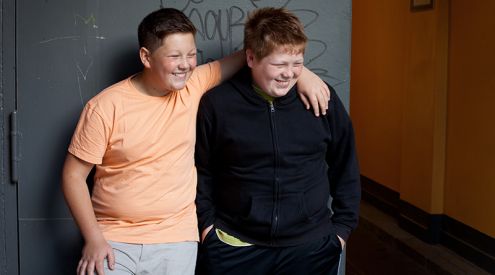Using data from the most recent MCS sweep, at age 14, this project examined a range of issues relevant to young people’s lives today:
- Mental ill-health and wellbeing
- The prevalence of risky behaviours in adolescence
- University and occupational aspirations
- Overweight and obesity
- Language development
Below you can read a summary of our briefings on each topic. You can also download and read the full briefings.
Mental ill-health and wellbeing
Key findings from this briefing include:
- Certain factors, such as being overweight, not getting along with peers and being bullied, were associated with high depressive symptoms for boys and girls at age 14.
- Girls from homes with lower family income were more likely to report poorer mental health and lower wellbeing than their better-off peers.
- Girls who enjoyed primary school and felt engaged in their studies were less likely to have higher depressive symptoms.
- Mental ill-health and poor wellbeing do not always go hand in hand: a large proportion of young people experienced low wellbeing despite not having high depressive symptoms; and a very small proportion of individuals, mainly boys, experienced good wellbeing in the presence of mental ill-health.
This was a follow up to an earlier briefing in this series, examining mental ill-health at age 14.
Risky behaviours: prevalence in adolescence
This briefing explores:
- How common risk-taking behaviour is among teenagers in the UK.
- Which risky activities teenagers are more likely to get involved in, including substance use and anti-social behaviour.
- How risky behaviours differ according to teenagers’ backgrounds.
The university and occupational aspirations of UK teenagers
This briefing shows:
- Girls thought they had a 71 per cent chance of going to university, and 14 per cent of girls were 100 per cent certain they would go
- Boys were less sure; their average expectation was 63 per cent, and just under 10 per cent were absolutely convinced they would get to university.
- Compared to boys, the average hourly wage for the occupations that girls aspired to was a striking 27 per cent or £6.49 lower.
Child overweight and obesity
This briefing reveals:
- 20 per cent of cohort members were obese at age 14 and a further 15 per cent were overweight.
- Between ages 11 and 14, most cohort members stayed in the same weight category. Boys were slightly more likely to have become normal weight than overweight or obese, while the opposite was the case for girls.
- 14-year-olds whose mothers had a low level of education were more likely to be of excess weight than those whose mothers had a degree.
What influences voacbulary?
This briefing investigates:
- The extent to which parents’ English language skills are passed on to their children.
- The influence of factors like parents’ level of education and ethnicity on children’s language development.
- The association between reading for pleasure and young people’s level of vocabulary.
Mental ill-health among children of the new century
Key findings from this briefing include:
- 24 per cent of girls and 9 per cents of boys were depressed at age 14.
- 14-year-olds from better-off families were less likely to have high levels of depressive symptoms compared to their peers from poorer homes.
- Emotional symptoms of 14-year olds often differed depending on whether they were reported by themselves or their parents.
This is the first of two briefings examining mental ill-health, in this series of age 14 initial findings.





